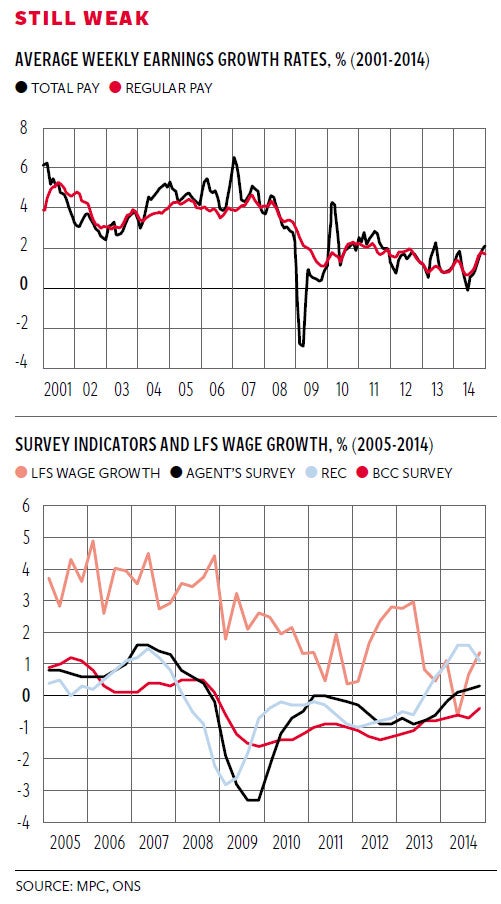David Blanchflower: Wages growth? The Bank of England appears to have lost its marbles
The Bank’s agents provided a special report on pay last week and showed they saw no expectation of much of any increase in wages growth at all

Your support helps us to tell the story
From reproductive rights to climate change to Big Tech, The Independent is on the ground when the story is developing. Whether it's investigating the financials of Elon Musk's pro-Trump PAC or producing our latest documentary, 'The A Word', which shines a light on the American women fighting for reproductive rights, we know how important it is to parse out the facts from the messaging.
At such a critical moment in US history, we need reporters on the ground. Your donation allows us to keep sending journalists to speak to both sides of the story.
The Independent is trusted by Americans across the entire political spectrum. And unlike many other quality news outlets, we choose not to lock Americans out of our reporting and analysis with paywalls. We believe quality journalism should be available to everyone, paid for by those who can afford it.
Your support makes all the difference.In its most recent Inflation Report, the Bank of England’s Monetary Policy Committee (MPC) unexpectedly, and without credible reason, raised its forecast for earnings growth to 3.5 per cent in 2015 and to 4 per cent in 2016 and 2017. In the minutes of its February meeting, the MPC even went as far as to claim that 4 per cent was possibly even an underestimate as there were risks that wages would increase more rapidly than that. Honestly, I think the MPC has collectively lost its marbles. Here is why.
The latest data from the Office for National Statistics shows that pay growth as measured by average weekly earnings (AWE) grew by 2.1 per cent in the year through December. This rise of 2.1 per cent was driven by a 22 per cent rise in bonuses paid in the financial sector, so when they are stripped out regular pay grew by 1.7 per cent, down from 1.8 per cent a month earlier.
The first chart plots the time series of AWE total and regular pay which excludes bonuses since 2005. The two series are noisy, with several peaks and troughs, but there is absolutely zero evidence from either of these two series that wage inflation is headed way above 2 per cent. These two series are certainly not consistent with the claims made by Mark Carney at the Inflation Press conference that “as the labour market has tightened, growth rates of wages… are beginning to pick up”. Indeed, in the February Inflation Report, the MPC said the AWE measure points to “a further pick-up in annual earnings growth”. This claim was rather at odds with the evidence of wage settlements that the MPC presented at the same time which have been unchanged at 1.8 per cent since the third quarter of 2010.
We should note here that settlements generally relate to workers who are trade unionists and are likely to reflect what the strongest workers are able to bargain for. So non-union staff, especially in small firms, and the self-employed are going to get less. What pick-up?
Each quarter, the ONS publishes wage data from the Labour Force Survey (LFS), which is a random sample of waged workers so shows less of an upwards bias than the AWE, which excludes workers employed in firms with fewer than 20 employees. Newly released data from the LFS showed that weekly wages for full-time employees rose by 1.4 per cent between Q4 of 2013 and Q4 of 2014. Hourly earnings rose by 1.6 per cent for full-timers and 1.3 per cent for part-timers. No sign of wages growth heading above 2 per cent any time soon here, either.

The second chart plots the LFS weekly earnings for full-time employees against data presented by the MPC from its agents, a British Chambers of Commerce survey, and from the KPMG/REC Jobs report. The MPC claims that these three indicators “point to a further a pick-up in pay growth”. Actually, they don’t seem to.
First, they are only weakly correlated with the LFS earnings measure. Second, the REC measure seems to be pointing to a slowdown recently, not a pick-up. Third, the three series were rising from Q2 of 2013 to Q2 of 2014, when wages growth was falling. It really is unclear that there is much of any information in these surveys. However, there does seem to be information about pay settlements from several sources which shows no evidence of any significant wages pick-up. The MPC doesn’t trust its own agents.
Interestingly, the Bank of England’s agents actually provided a special report on pay last week and showed that they saw no expectation of much of any increase in wages growth at all. They argued that growth in total labour costs “had been steady” and a “very slight increase in wage settlements in 2015”. It is unclear how a very slight increase constitutes a “pick-up”. Plus, these pay data contradict the unit cost data used by the MPC in the second chart.
In its survey of 436 firms employing about one million workers, it found that the average pay settlement was expected to rise by a slither, from 2.4 per cent in 2014 to 2.5 per cent in 2015. Of interest also was the fact that around 25 per cent of firms said an inability to pay was pushing down on settlements; a further 30 per cent cited falling inflation expectations. This was about the same as those who said retention and recruitment was pushing them to increase pay. This evidence of pay settlements just above 2 per cent was cited by three other major organisations, all of whom tell an identical story of no pick-up.
The XpertHR pay databank examined 85 pay awards from the fourth quarter of 2014 and found that the median pay award was 2 per cent, unchanged from the previous three months. In January, the average settlement was 2.1 per cent. Of note also was its report that Nissan Motor Manufacturing agreed a two-year settlement with the Unite union paying 3 per cent a year. It also reported a two-year, 2 per cent settlement by the Scottish Joint Industry Board for the Electrical Contracting Industry for 12,000 electricians.
The EEF manufacturer’s association reported “manufacturing pay growth steady”. The average pay settlement in manufacturing that the EEF reported for the three months from November to January was 2.3 per cent, unchanged from the three months to December, but “fractionally down on the 2.4 per cent to 2.6 per cent range reported in manufacturing since early 2011”. So a fall, not a pick-up. Finally, the Chartered Institute of Personnel and Development’s latest Labour Market Outlook reports the results of a survey it conducted with 1,000 of its members. Average wage settlements for 2015 are expected to be 2 per cent in the private sector and 1 per cent in the public sector. Nine per cent of employers expect to impose a pay freeze. According to a survey of 2,250 employees, 44 per cent said they had experienced a pay freeze or a cut.
Once again, ability to pay is a major concern, and, I quote, “nearly half of employers report that average basic pay will fall below 2 per cent because the organisation cannot afford to pay more”. Even with average settlements of about 2 per cent and inflation at 0.3 per cent, many workers will still be seeing real wage cuts.
To get an average of 3.5 per cent for the year that the MPC is predicting we will need to see some settlements as high as 7 per cent or 8 per cent in the private sector, not least to counter those firms with pay freezes and very low pay growth in the public sector. As a matter of simple arithmetic, it will certainly be necessary, at some point this year, that we get AWE wages growth close to 5 per cent for a few months to counter growth rates below 2 per cent that we are seeing in early 2015.
The MPC’s Martin Weale, who sees raging wage inflation hiding behind every lamppost, wrote in The Observer: “Pay growth is picking up. The picture I get from the businesses I visit throughout the country is very different from what I was hearing a year ago.” The actual data says otherwise.
Join our commenting forum
Join thought-provoking conversations, follow other Independent readers and see their replies
Comments